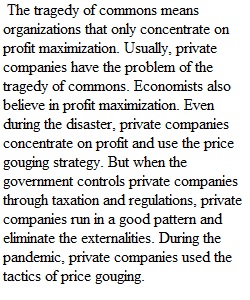


Q Cod- A Tragedy of the Commons Another important example of the tragedy of the commons is overfishing. Fish can be found in lakes, oceans, rivers, and streams, which are typically not owned by any one person. Anyone can fish in these places, so the places are a “commons" and the fish are a common-pool resource. But there is never an infinite supply of fish. Each individual fisher may want to catch as many fish as he or she can, but if everyone does this, then the supply of fish will be depleted. The depletion is the “tragedy," and it is unsustainable. Eventually, there will be no more fish, and no one will be able to fish anymore. On the other hand, if everyone exercises restraint and doesn’t remove too many fish, then the fish will be able to reproduce, the supply of fish will not become depleted, and fishing can persist indefinitely Overfishing is a major global issue. Many fish populations have become severely depleted due to overfishing. One example is the population of cod off the Atlantic coast of the United States and Canada Between the mid-1970s and early 1990s, a series of poor management decisions and inadequate understanding of complex marine ecosystems led to the collapse of the cod fishery, devastation of livelihoods, a flux of environmental refugees, and long-term impacts on the northwest Atlantic ecosystem off the coast of the northern United States and Canada. Overfishing can result in permanent collapses in fish supplies. If a population of fish gets completely wiped out, then it cannot reproduce and regrow its numbers, even if people stop fishing entirely. In other words, the collapse can be irreversible. Irreversible collapses can be found in other instances of the tragedy of the commons, including biodiversity loss and certain ecological disruptions. But not all instances of the tragedy of the commons are irreversible. For example, overgrazing in Boston Common causes only a temporary loss of grass, since people can always grow more grass there What Is The Best Way To Solve The Tragedy Of The Commons Links to an external site.? You might think that the only way to solve environment problems is to rely on the government to issue regulations that strictly limit access and use of our environmental resources. But we can also solve many of our environmental problems by assigning property rights to individuals or communities. Property rights give individuals and communities an incentive to manage, protect, and improve what they own. It might sound unrealistic to assign property rights to the air we breathe, the water we drink, or endangered animals, but governments have found creative ways to effectively assign property rights for important natural resources. Economist Gary Libecap explains how this works here:Links to an external site. “In both air pollution control and fishery regulation there has been an ingenious “property rights” solution. Because air and migratory ocean fisheries cannot be easily bounded into individual property rights, the alternative has been to designate private “use rights” to the resource, while not to the resource itself. What this means is that fishermen have a right to fish, but do not own the fishery. Similarly, firms have the right to pollute, but do not own the atmosphere. While traveling fish stocks and the air cannot easily be carved up into property rights, their use can.” The Pollution SolutionLinks to an external site. by Gary D. Libecap via Hoover Institution By far the most common response to providing environmental quality or to conserving natural resources has been command-and-control regulations where the government decides what actions shall be taken by individuals and organizations to meet an environmental objective and enforces them with its police powers. The video below highlights one example, where British Columbia overcame overfishing by creating a market for the right to fish. As the video explains, “By using market forces to make it in the fishermen's interest to have a healthy and sustainable population of fish, overfishing fell dramatically.” Anderson coined the phrase “free-market environmentalism” to describe a flexible, market-driven approach to protecting the environment. This approach focuses on creating the right public policies so that the private incentives and interests of businesses, families, and individuals align with society’s best interest. B.4.2.4 Advanced Explanation- Common Resource- Tragedy of the Commons QuickWrite Question: 1. Offer a commentary of the private market alternatives to taxes or regulations to mitigate the externalities of the Tragedy of the Commons. 2. Does private ownership of the resources (or rights to harvest the resources) offer a better long term solution to the externalities defined in the Tragedy of the Commons. Assignment Requirements: This is not an analytical paper, but a summary analysis of your knowledge of the concepts in this chapter. Students ARE NOT to cut and paste from the internet. You are welcome to add cited sources to your response. The response should be about 300 words (one page). Students posting less than a 300 word response will get reduced or no credit. Students may want to construct this response on a Google Doc and then post or submit the item to this portal. These responses are run against public sources via Turnitin.com (running inside Canvas) Submitting an Assignment via Google.Doc. - You can also just paste the text into the box
View Related Questions